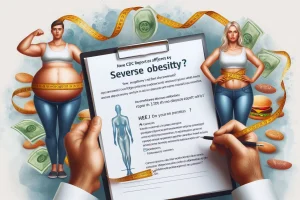Reports Women Are Affected By Severe Obesity More Than Men

In a striking revelation, the Centers for Disease Control and Prevention (CDC) has released new data showing that women are affected by severe obesity more than men. This significant finding highlights the growing concern around gender disparities in health, particularly when it comes to obesity. Obesity is a serious public health issue in the United States, affecting millions of people and increasing the risk of numerous chronic conditions such as heart disease, diabetes, and certain cancers. However, this latest CDC report emphasizes that women are disproportionately bearing the brunt of severe obesity, raising critical questions about why this gender gap exists and what can be done to address it.
- Reports Women Are Affected By Severe Obesity More Than Men
- Understanding the Gender Disparity in Severe Obesity
- The Health Impacts of Severe Obesity on Women
- Barriers to Weight Loss: Why Women Struggle More Than Men
- Addressing Severe Obesity: What Can Be Done?
- Conclusion: Bridging the Gender Gap in Obesity
Severe obesity is categorized as having a body mass index (BMI) of 40 or more, and it is associated with a host of life-threatening health complications. For women, especially those from marginalized communities, the challenges and risks associated with severe obesity are even more pronounced. This report sheds light on the need for targeted interventions and a deeper understanding of the underlying factors that contribute to this disparity between men and women.
Understanding the Gender Disparity in Severe Obesity
The CDC’s findings suggest that gender plays a significant role in the prevalence of severe obesity. While obesity affects both men and women, severe obesity is more common among women, with the gap widening as BMI levels increase. According to the data, nearly 10% of women in the U.S. fall into the category of severe obesity, compared to just 6% of men. This disparity is even more pronounced in women of certain ethnic backgrounds, particularly African American and Hispanic women, who are disproportionately impacted by obesity-related health challenges.
Several factors contribute to this gender disparity. First, biological differences between men and women can influence how fat is stored and distributed in the body. Women tend to store fat more easily than men, particularly around the hips and thighs, which can contribute to higher rates of obesity. Hormonal changes, such as those experienced during pregnancy or menopause, can also affect weight gain and fat distribution. Women may also face unique challenges when it comes to weight loss, as hormonal fluctuations can make it harder to lose weight or maintain a healthy weight.
In addition to biological factors, societal and psychological influences play a significant role in the gender disparity in severe obesity. Women often face greater social pressure to conform to certain body standards, which can lead to emotional eating, body image issues, and disordered eating behaviors. Moreover, women are more likely to experience weight stigma and discrimination, which can exacerbate feelings of stress and anxiety—two factors closely linked to weight gain. The mental health component of obesity is often overlooked but is a critical piece of the puzzle when examining why severe obesity affects women more than men.
The CDC report underscores the need for a comprehensive approach to addressing severe obesity, one that takes into account not only the biological differences between men and women but also the societal pressures and mental health challenges that disproportionately affect women. By understanding these factors, healthcare providers can offer more personalized, effective interventions to help women manage their weight and reduce the health risks associated with severe obesity.
The Health Impacts of Severe Obesity on Women
Severe obesity has far-reaching consequences on health, particularly for women. The CDC report highlights that women with severe obesity are at a significantly higher risk of developing chronic conditions compared to their male counterparts. These conditions include cardiovascular diseases, type 2 diabetes, osteoarthritis, and certain cancers, such as breast and ovarian cancer. The health risks are not only limited to physical health but extend to mental health as well, with higher rates of depression, anxiety, and eating disorders among women with severe obesity.
Cardiovascular disease is one of the most significant health risks associated with severe obesity. Women who are severely obese are more likely to suffer from high blood pressure, elevated cholesterol levels, and an increased risk of heart attacks and strokes. This is partly due to the fact that excess body fat can lead to the buildup of plaque in the arteries, restricting blood flow and increasing the likelihood of cardiovascular complications.
Type 2 diabetes is another critical concern, as women with severe obesity are more likely to develop insulin resistance, a precursor to diabetes. This condition occurs when the body’s cells become less responsive to insulin, leading to elevated blood sugar levels. Over time, uncontrolled blood sugar can damage vital organs, including the heart, kidneys, and eyes, leading to a host of complications.
In addition to cardiovascular disease and diabetes, severe obesity is a significant risk factor for osteoarthritis, particularly in women. Carrying excess weight puts added stress on the joints, particularly the knees and hips, which can lead to the breakdown of cartilage and the development of osteoarthritis. Women with severe obesity are more likely to experience joint pain and reduced mobility, making it even harder to engage in physical activity, which is crucial for weight management and overall health.
Finally, women with severe obesity are at a higher risk for certain types of cancer, including breast, ovarian, and endometrial cancers. Excess body fat can increase the production of estrogen, which has been linked to the development of hormone-related cancers. The CDC’s findings serve as a reminder that severe obesity is not just a cosmetic issue but a serious health concern that requires immediate attention.
Barriers to Weight Loss: Why Women Struggle More Than Men
The CDC report also highlights the unique challenges women face when trying to lose weight. While obesity affects both genders, women often experience more significant barriers to weight loss, which can contribute to higher rates of severe obesity. One of the primary reasons for this is the biological differences in how men and women’s bodies process and store fat. Women’s bodies are naturally inclined to store fat for reproductive purposes, which can make weight loss more difficult.
Hormonal changes throughout a woman’s life also play a significant role in weight gain and the difficulty in losing weight. Pregnancy, menopause, and even monthly menstrual cycles can cause hormonal fluctuations that affect appetite, metabolism, and fat storage. For example, many women experience weight gain during menopause due to decreased estrogen levels, which can lead to an increase in abdominal fat.
Additionally, socioeconomic factors can create barriers to weight loss for women. Women are more likely than men to be the primary caregivers in their households, which can limit the time and resources available for exercise and healthy meal preparation. Economic disparities also mean that women, particularly those from low-income households, may have less access to healthy foods, safe spaces for physical activity, and healthcare resources.
Psychological factors, such as body image concerns and emotional eating, can further complicate women’s efforts to lose weight. Women are more likely than men to engage in emotional eating, using food as a way to cope with stress, anxiety, and other negative emotions. This behavior can lead to overeating and make it harder to achieve long-term weight loss goals. Furthermore, societal pressures to conform to certain body standards can lead to disordered eating behaviors, such as yo-yo dieting, which is both ineffective and damaging to long-term health.
Given these barriers, the CDC report emphasizes the need for tailored weight loss interventions that take into account the unique challenges women face. Healthcare providers should consider a holistic approach to weight loss that addresses not only diet and exercise but also the mental, emotional, and societal factors that contribute to severe obesity in women.
Addressing Severe Obesity: What Can Be Done?
The CDC report makes it clear that severe obesity is a growing public health crisis, particularly for women. To address this issue, a multi-faceted approach is needed, one that combines public health initiatives, healthcare interventions, and personal lifestyle changes. At the societal level, public health campaigns can help raise awareness about the risks of severe obesity and the importance of maintaining a healthy weight. These campaigns should target at-risk populations, including women of childbearing age and women from marginalized communities, who are disproportionately affected by obesity.
On an individual level, women can take steps to manage their weight and reduce the risk of severe obesity by adopting a balanced, nutrient-dense diet and engaging in regular physical activity. Incorporating more fruits, vegetables, whole grains, and lean proteins into daily meals can help promote weight loss and improve overall health. Regular exercise, even in small amounts, can make a significant difference in preventing severe obesity. Activities such as walking, swimming, and yoga can help women maintain a healthy weight while also improving mental and emotional well-being.
Healthcare providers also play a critical role in addressing severe obesity in women. Routine screening for BMI, along with blood pressure and cholesterol checks, can help identify individuals at risk for severe obesity and its related health complications. For women who are already struggling with severe obesity, healthcare providers can offer a range of treatment options, including dietary counseling, weight loss medications, and, in some cases, bariatric surgery. These interventions can help women achieve sustainable weight loss and reduce their risk of obesity-related health problems.
Conclusion: Bridging the Gender Gap in Obesity
The CDC’s new reports showing that women are affected by severe obesity more than men serve as a call to action for both healthcare providers and individuals to address this growing public health issue. While obesity affects millions of Americans, women are disproportionately impacted, facing unique biological, psychological, and societal challenges that contribute to their higher rates of severe obesity. By understanding these factors and implementing targeted interventions, we can begin to bridge the




